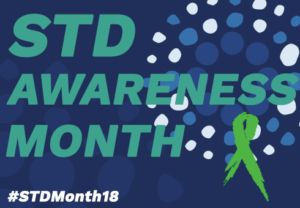Untreated STDs
While most STDs and STIs are curable, cases that are left untreated can pose a host of complications. In recent years, chlamydia, gonorrhea, and syphilis have been making a comeback, leading to:
- An increase of babies born with syphilis
- A higher risk of infertility
- A greater risk of getting or giving HIV
- The possible development of untreatable gonorrhea
- Unknowingly spreading the disease or infection to others
Some people with STDs and STIs will exhibit symptoms that signal there’s a problem. However, there are many cases that won’t present symptoms but are still contagious, making it very easy to infect others.
Take Control of Your Health
Because STD testing is not standard in general wellness checks, it’s important to be direct with your healthcare provider in requesting tests. The Centers for Disease Control and Prevention (CDC) is encouraging people to take action this month with the following:
- Get Yourself Tested: Because these diseases can have a big impact on the lives of younger people, it’s important to get tested and encourage friends and partners to do the same. It’s also important to be educated so you can separate the facts from the rumors about STDs.
- Test. Treat.: Talking about sex isn’t always easy for some. This specific campaign from the CDC encourages being open and honest about sexual health with both your sexual partner and physician. By speaking openly, your doctor can recommend certain tests and provide necessary treatment, and your partner can do the same.
- Syphilis Strikes Back: Although syphilis is a risk for anyone, prevention, diagnosis, and treatment is particularly vital for pregnant women, newborn babies, and gay and bisexual men. These groups have seen the biggest increase in syphilis infections, so it’s important to do your part to reduce the numbers.
- Treat Me Right: It’s important to have trust in your healthcare provider while also understanding how to be in control of your own personal health. Sexual health can be difficult to talk about, but if you have a physician you trust, these conversations can be much simpler.
TIps in preventing STD’s:
1-Do not have sex but not realistic for many!
2-Prevention! This is the most obvious and effective way to avoid the transmission of STDs. As we just mentioned, many STDs are spread via the exchange of bodily fluids. You actually need to swap a lot of bodily fluids, however, meaning that a kiss isn’t likely to spread anything more serious than herpes. And even if you were to swallow a little blood after biting a lip too hard, it’s highly unlikely that would be enough to transmit HIV (though we don’t recommend testing the theory!).
3.Sometimes, something as simple as taking a shower after sex can be an effective way to reduce your likelihood of catching an STD. This can help to remove bacteria and other causes of illness off of your body, as well as removing fluids that might still be lingering.
Just make sure to bring your own towel! Be discrete in how you approach this to avoid offending your partner.
And the same goes for some other strategies. It’s up to you then to decide how you want to proceed. But if nothing else, make sure to use a condom. Even if it is an awkward thing to bring up at the moment.
4-Maintain good health and if not feeling well when this time is approached (sex engagement) hold off for both sides.
5-If you have any reason to worry after having sex, then you should always get yourself checked with a doctor.
6-Ask about your partner’s history when first having sex.
7-Think it’s awkward asking your potential partner if they brought protection? Well then try stopping them before sex to ask how many previous partners they’ve had, if they knew all of them first, and whether they’ve been checked for STDs previously.
So, no, this isn’t always going to be a viable strategy. But in cases where you feel comfortable with the other party, or if you’re keen to be as careful as you possibly can be: this can be a good option.
8-Be wise in choosing who you have sex with.
This goes without saying, but choosing your partners carefully is always wise. While you should never judge a book by its cover, and while anyone could be carrying an STD, there are certainly some warning signs that you can look out for.
If someone has had a lot of sexual partners for instance, then they are more likely to have an STD. If they don’t suggest protection prior to sex, then it suggests that they probably would have had sex with other people unprotected.
